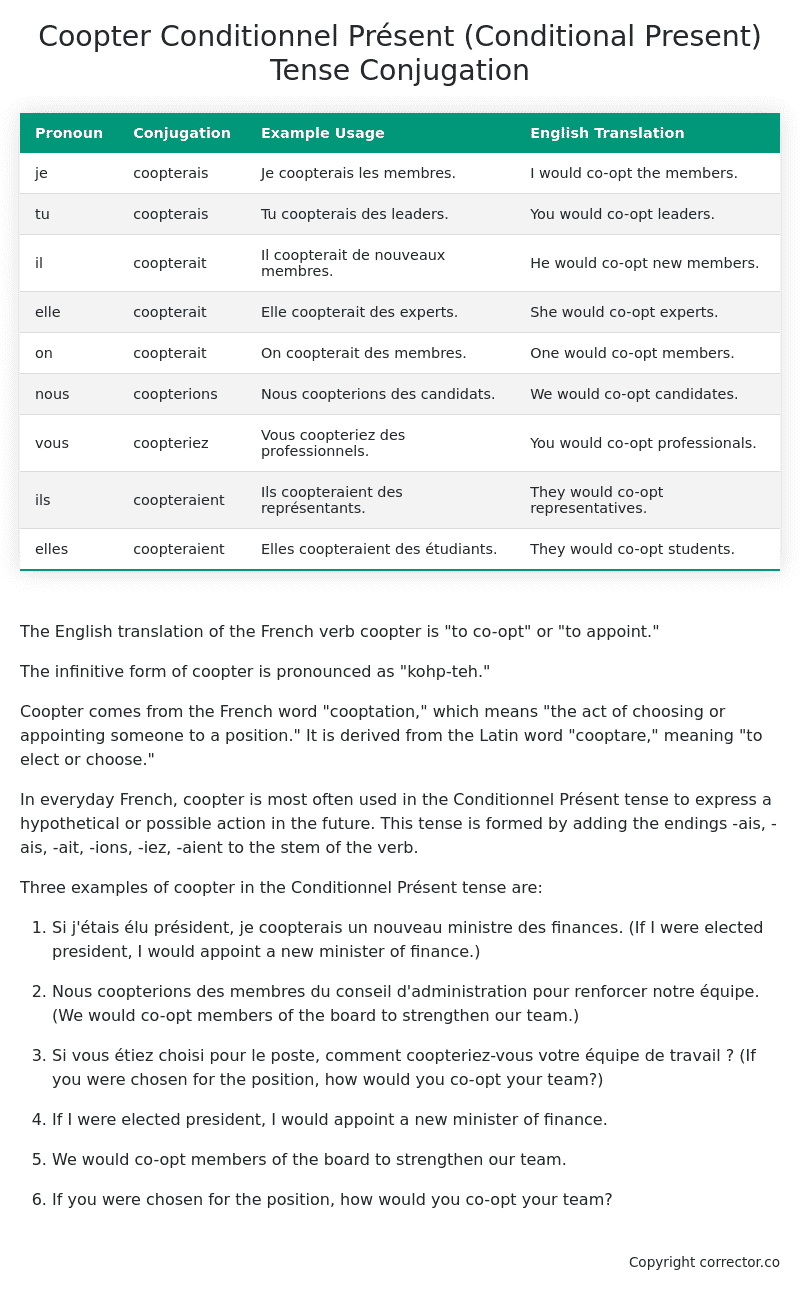Conditionnel Présent (Conditional Present) Tense Conjugation of the French Verb coopter
Introduction to the verb coopter
The English translation of the French verb coopter is “to co-opt” or “to appoint.”
The infinitive form of coopter is pronounced as “kohp-teh.”
Coopter comes from the French word “cooptation,” which means “the act of choosing or appointing someone to a position.” It is derived from the Latin word “cooptare,” meaning “to elect or choose.”
In everyday French, coopter is most often used in the Conditionnel Présent tense to express a hypothetical or possible action in the future. This tense is formed by adding the endings -ais, -ais, -ait, -ions, -iez, -aient to the stem of the verb.
Three examples of coopter in the Conditionnel Présent tense are:
-
Si j’étais élu président, je coopterais un nouveau ministre des finances. (If I were elected president, I would appoint a new minister of finance.)
-
Nous coopterions des membres du conseil d’administration pour renforcer notre équipe. (We would co-opt members of the board to strengthen our team.)
-
Si vous étiez choisi pour le poste, comment coopteriez-vous votre équipe de travail ? (If you were chosen for the position, how would you co-opt your team?)
-
If I were elected president, I would appoint a new minister of finance.
-
We would co-opt members of the board to strengthen our team.
-
If you were chosen for the position, how would you co-opt your team?
Table of the Conditionnel Présent (Conditional Present) Tense Conjugation of coopter
| Pronoun | Conjugation | Example Usage | English Translation |
|---|---|---|---|
| je | coopterais | Je coopterais les membres. | I would co-opt the members. |
| tu | coopterais | Tu coopterais des leaders. | You would co-opt leaders. |
| il | coopterait | Il coopterait de nouveaux membres. | He would co-opt new members. |
| elle | coopterait | Elle coopterait des experts. | She would co-opt experts. |
| on | coopterait | On coopterait des membres. | One would co-opt members. |
| nous | coopterions | Nous coopterions des candidats. | We would co-opt candidates. |
| vous | coopteriez | Vous coopteriez des professionnels. | You would co-opt professionals. |
| ils | coopteraient | Ils coopteraient des représentants. | They would co-opt representatives. |
| elles | coopteraient | Elles coopteraient des étudiants. | They would co-opt students. |
Other Conjugations for Coopter.
Le Present (Present Tense) Conjugation of the French Verb coopter
Imparfait (Imperfect) Tense Conjugation of the French Verb coopter
Passé Simple (Simple Past) Tense Conjugation of the French Verb coopter
Passé Composé (Present Perfect) Tense Conjugation of the French Verb coopter
Futur Simple (Simple Future) Tense Conjugation of the French Verb coopter
Futur Proche (Near Future) Tense Conjugation of the French Verb coopter
Plus-que-parfait (Pluperfect) Tense Conjugation of the French Verb coopter
Passé Antérieur (Past Anterior) Tense Conjugation of the French Verb coopter
Futur Antérieur (Future Anterior) Tense Conjugation of the French Verb coopter
Subjonctif Présent (Subjunctive Present) Tense Conjugation of the French Verb coopter
Subjonctif Passé (Subjunctive Past) Tense Conjugation of the French Verb coopter
Subjonctif Imparfait (Subjunctive Imperfect) Tense Conjugation of the French Verb coopter
Subjonctif Plus-que-parfait (Subjunctive Pluperfect) Tense Conjugation of the French Verb coopter
Conditionnel Présent (Conditional Present) Tense Conjugation of the French Verb coopter (this article)
Conditionnel Passé (Conditional Past) Tense Conjugation of the French Verb coopter
L’impératif Présent (Imperative Present) Tense Conjugation of the French Verb coopter
L’infinitif Présent (Infinitive Present) Tense Conjugation of the French Verb coopter
Struggling with French verbs or the language in general? Why not use our free French Grammar Checker – no registration required!
Get a FREE Download Study Sheet of this Conjugation 🔥
Simply right click the image below, click “save image” and get your free reference for the coopter Conditionnel Présent tense conjugation!

Coopter – About the French Conditionnel Présent (Conditional Present) Tense
Formation
Common Everyday Usage Patterns
Expressing Polite Requests
Expressing Hypothetical Situations
Expressing Doubt or Uncertainty
Interactions with Other Tenses
Present Tense
Past Tense
Future Tense
Conditional Perfect
Summary
Want More?
I hope you enjoyed this article on the verb coopter. Still in a learning mood? Check out another TOTALLY random French verb conjugation!


